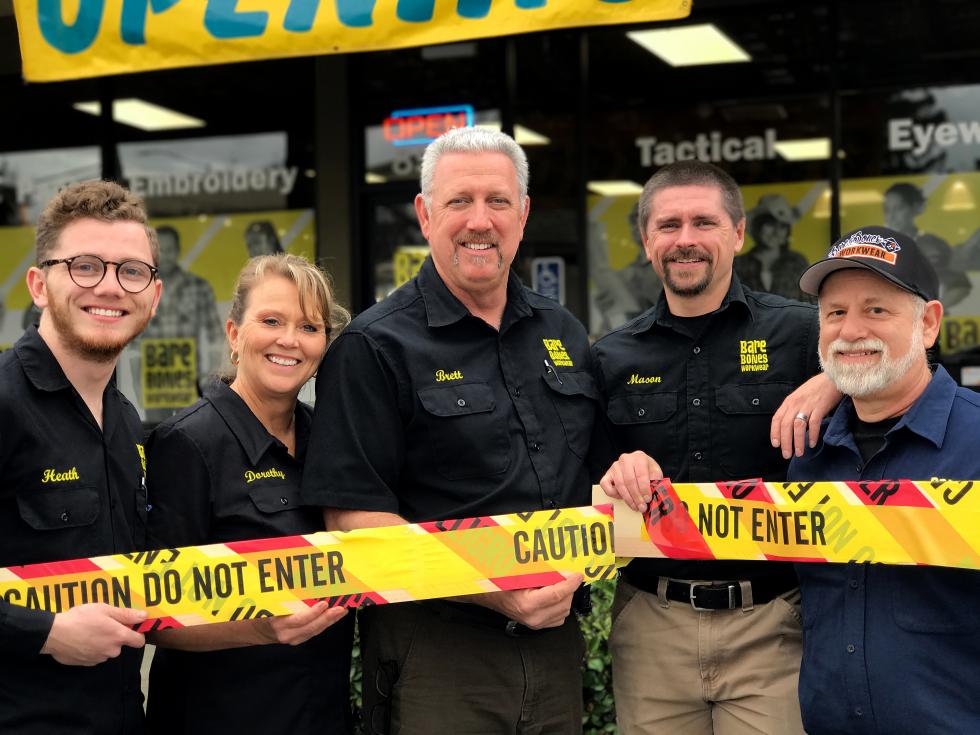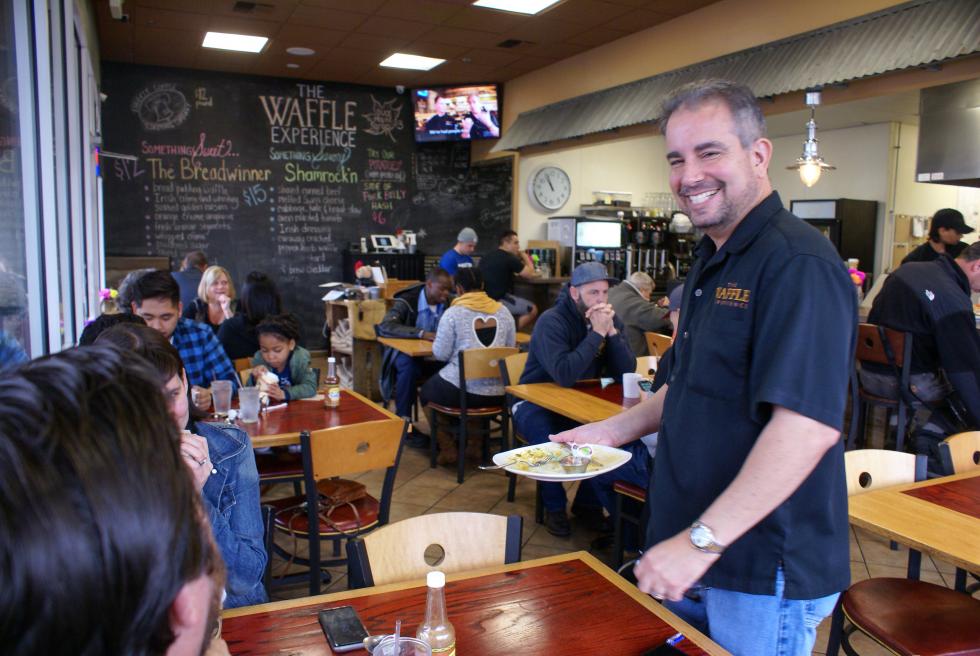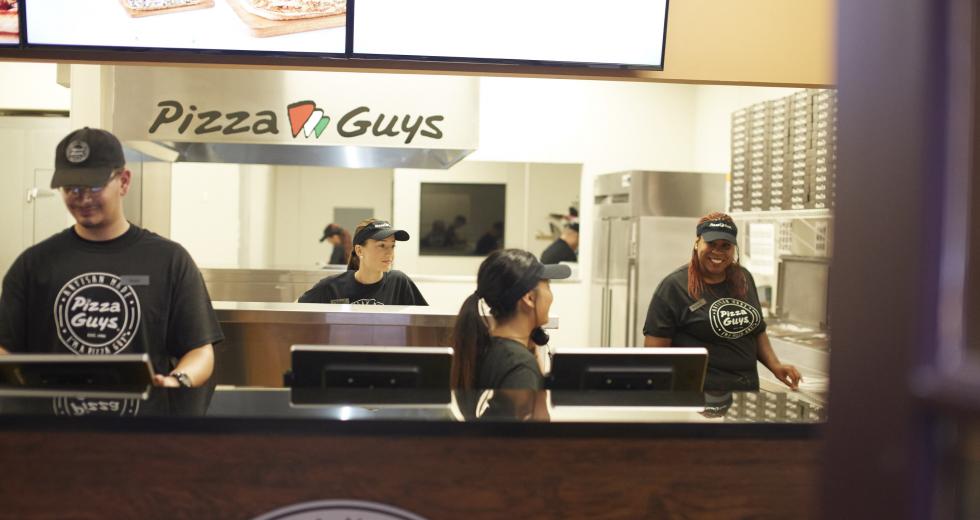Barebones Workwear co-founder Stu Nelson has plenty of advice for those considering franchising their small business in California. He should know — he started with one shop in Sacramento 14 years ago, and has since opened three franchise locations.
But Nelson learned the hard way the perks and pitfalls that come with expanding one’s brand, as he recently terminated agreements with two locations — in Rocklin and Yuba City — for not sticking to the specialty clothing brand’s concept.
“We feel very strongly we have to keep a consistent brand,” he says. “The methods and ways we treat our customers are paramount to us. People may see it as a negative, but it shows we’re concerned about the integrity of our brand.”
Barebones Workwear started with one shop in Sacramento, before
opening three franchise locations — two have since closed. Photo
courtesy Barebones Workwear

Nelson’s first piece of advice is to lawyer up; find one who specializes in franchise law, he says. Then attend a bunch of seminars and conventions, soak up knowledge, and build a support network of developers, designers and franchise brokers. Get a consultant, one who specializes in expanding businesses in this manner. Then do more training. Become a certified franchise executive through the International Franchise Association. And get ready for a lot of work. Anticipate some hard lessons.
“It’s really a whole separate business in addition to the one you’re in,” Nelson says. “Even though we’re still called an emerging franchise, and the success rate is not very large in getting beyond where we’re at, we’re sure in the long term we’ll do well.”
Franchising is a way to expand a business and distribute goods and services through a licensing relationship, according to the IFA. In this arrangement, the franchisor is the person or company that grants a license to a franchisee to conduct business under its trademark with the franchise’s branding, policies and procedures, and operating systems.
Some of the more famous franchises include McDonald’s, most notably, followed by 7-Eleven, Dunkin’ Donuts, The UPS Store, RE/MAX and a host of other fast-food and service chains.
Franchise success rates are often touted online as being wildly successful, but further examination has shown attaining reliable data is difficult. The franchise arrangement is inherently risky for both parties — the franchise owner and entrepreneur. Nineteen percent (or nearly one in six) of franchise loans made through the Small Business Administration from 2006 to 2010 ended in failure, according to a report by the Service Employees International Union.
But some Sacramento-based small businesses are going for it regardless. Seasoned examples such as Jimboy’s Tacos, Pizza Guys and Dos Coyotes, as well as newer ones, have all been met with varying degrees of success.
Pizza Guys President and CEO Shahpour Nejad began in the mid-1980s with one Sacramento location. He soon opened seven pizza shops, and today there are 65 between California, Nevada and Oregon (with Arizona on the way).
When Nejad had seven stores, he knew there were only two ways to expand — either operate all the stores himself, or find people willing to bring his brand to new areas.
He opted for the latter and in 1993 contacted a franchise attorney. After nearly a year of creating a foundation for franchising that included proprietary recipes, policies and procedures and an operations handbook, he was bringing on an average of 10 franchises each year.
What’s worked for him is twofold — finding quality franchisees, and tapping the right location and demographics. “We don’t talk to people who just want to make money at whatever cost,” Nejad says. “Money comes second if you do your job right.”
His advice to those considering this expansion model? Decide a lot quicker than he did. “Usually people know if they want to only open one store or have multiple stores,” he says. “And if you’re in the wrong area with the wrong people, you’re not going to succeed.”
The Waffle Experience co-owner Jeff Belaski opened his first
location in Natomas, and is now getting a franchise off the
ground in Elk Grove. Photo by Karen Wilkinson

The Waffle Experience co-owner Jeff Belaski is currently getting his first franchise off the ground in Elk Grove. He opened his first location in Natomas three years ago, and then attended franchise development school at a cost of $40,000 in March 2017. He brought on a franchise law firm, and learned about potential pitfalls such as getting caught up in lawsuits — so he’s specific in his contract, even down to the type of dishware franchises can use, the menu, and the policies and procedures.
He sees branding and consistency as pivotal to success. “You can not waiver, you have to hold true to your company’s vision,” he says. “You don’t want to run it with an iron fist, but you gotta run it like a business. It has to be consistent.”
It was his business partner and long-term Marine Corps buddy Michael Donoho’s dream to launch a waffle concept restaurant. Belaski didn’t have much restaurant experience at the time. He’d been a host at the Olive Garden in the late 1980s, and prior to opening a restaurant, sold insurance. But he’s driven, believes in his brand and doesn’t see failure as an option.
His biggest nugget of advice? Never let people tell you that you can’t do it. “People want you to fail because they’ve never been a success,” he says. “I don’t have time for negativity, to listen to people’s reasons why I can’t.
“Had I listened to that, I’d still be selling insurance.”




Comments
As a franchise lawyer I heartily endorse the need to consult with experienced franchise lawyers and consultants before getting into franchising.
Allow me to put the SBA franchise law default rate, attributed to SEIU (which has a well-documented agenda against franchising) in perspective.
1. the last two years of the survey were during the Great Recession, when many more businesses failed than in other years.
2. According to a contemporaneous (2012) SBA study, 50% of small business fail during their first 5 years. The franchisee loan default rate is less than 20%. Assuming that these statistics are more or less accurate, the franchise SBA default rate is 2.5 times less than non-franchised small businesses failure rate.
3. SBA is generally the lender of last resort, so it would be unsurprising that its default rates seem high. But, the relative default rate and business failure rate that SBA presents show the benefits of a franchise investment, but it certainly shows that the investment in a new business, franchise or independent, involves risk. Prospective franchisees must understand that.